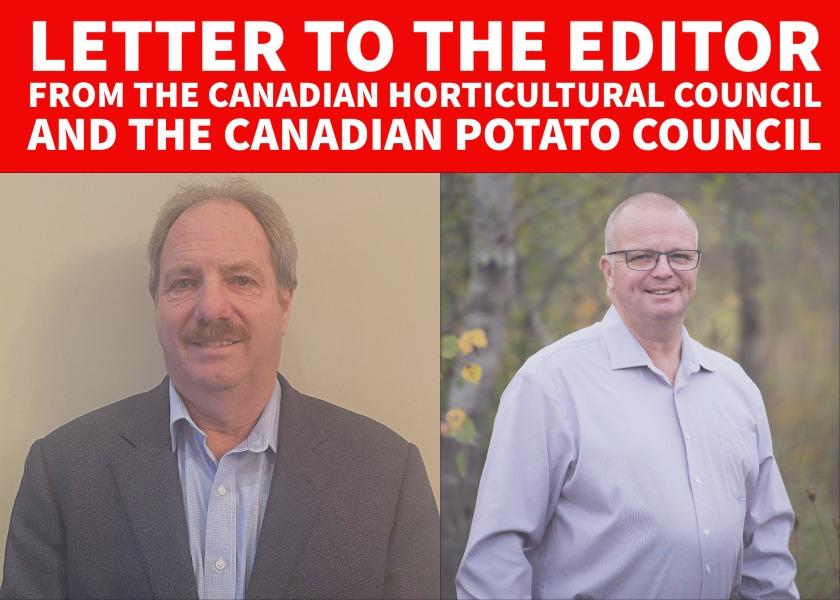Letter to the Editor from The Canadian Horticultural Council and the Canadian Potato Council

Letter to the Editor from the Canadian Horticultural Council (CHC) and the Canadian Potato Council:
The Packer received this letter to the editor from the Canadian Horticultural Council (CHC) and the Canadian Potato Council on Dec. 3 in response to an opinion article, Simple questions about devastating disease require transparent answers, authored by Kam Quarles published online by The Packer on Dec. 2.
December 3, 2021 - The Canadian Horticultural Council (CHC) and the Canadian Potato Council (CPC) jointly submit this letter on behalf of potato growers across Canada in response to an opinion article that was published in The Packer on December 2, 2021.
The article is in in reference to the Prince Edward Island (PEI) potato industry and the regulatory actions that have been taken in response to the detection of potato wart, which includes several inaccuracies that we believe need to be addressed. Specifically, the CHC and CPC would like to highlight the following points:
- The situation in PEI is dissimilar to previous events in Newfoundland, as suggested. It is inaccurate to conflate the situations of the two provinces, as PEI has not experienced the same degree of wide geographic spread. Rather, it more closely mirrors the localized and controlled situations of Pale Cyst Nematode (PCN) in Idaho, and Golden Nematode (GN) in New York.
- The article inaccurately suggests the Canadian Food Inspection Agency (CFIA) soil sampling program for potato wart has decreased by 75% over the past five years. Soil sampling in PEI follows a regular schedule based on a management plan that is agreed upon by CFIA and USDA. As a result, it is natural to have variation year-to-year depending on what is included in the management plan, and the samples tested in 2020. Moreover, when looking at broader trends of CFIA sampling over the past several years, it is easy to see that the frequency of soil sampling has actually increased over the past five years.
- The recent detections of potato wart occurred on farms that were already regulated. In a similar way to expansions in PCN infected land in Idaho being likely due to past detections in an infested area, the finding of potato wart in PEI were on farms that were involved with previous finds. In addition, potatoes originating from these two farms do not leave the province.
- The article discounts the benefits of visual surveillance, despite there being no evidence that soil testing is more effective at detection. It is important to clarify that both soil testing and visual detection are used to complement each other as part of a robust management plan. In many areas around the world, soil testing is used to delimit following the visual detection of a pest. Considerable visual inspection is also why industry is confident that there is no additional spread.
- There is a different risk factor between tubers with soil and those that are washed and graded. Washing and grading (and sprout inhibition) are accepted and effective risk mitigation measures for pest transmission on potato tubers yet are not recognized in this article.
- The article suggests that the regulatory actions taken by CFIA provide no benefit to the US potato industry, and actually hurt it. This statement is simply untrue, as the removal of competition in the US marketplace has already resulted in higher prices for domestic US products and shortages in some situations.
While the CHC and CPC certainly acknowledge the need for the National Potato Council to advocate on behalf of their growers, it is important that the information shared is factual and tells the entire story.
With that in mind, we are respectfully asking you to address the inaccuracies shared in that article and provide an opportunity for the Canadian industry to address the assertions that were made.
Sincerely,

Jan VanderHout, chair of the Canadian Horticultural Council

Bill Zylmans, president Canadian Potato Council

Rebecca Lee, executive director, Canadian Horticultural Council







